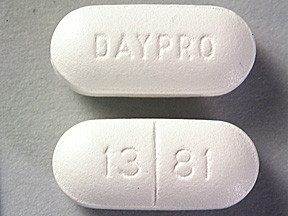OXAPROZIN - ORAL
PHONETIC PRONUNCIATION: (OX-a-PROE-zin)
COMMON BRAND NAME(S): Daypro
GENERIC NAME(S): oxaprozin
Uses
USES: Oxaprozin is used to treat arthritis. It reduces pain, swelling, and stiffness of the joints. Oxaprozin is known as a nonsteroidal anti-inflammatory drug (NSAID). If you are treating a chronic condition such as arthritis, ask your doctor about non-drug treatments and/or using other medications to treat your pain. See also Warning section.
How to use OXAPROZIN - ORAL
HOW TO USE: Read the Medication Guide provided by your pharmacist before you start taking oxaprozin and each time you get a refill. If you have any questions, ask your doctor or pharmacist. Take this medication by mouth as directed by your doctor, usually once daily. Drink a full glass of water (8 ounces/240 milliliters) with it unless your doctor directs you otherwise. Do not lie down for at least 10 minutes after taking this drug. If stomach upset occurs while taking this medication, take it with food, milk, or an antacid. The dosage is based on your medical condition, body weight, and response to treatment. The manufacturer recommends that adults should not take more than 1,800 milligrams per day or 26 milligrams per kilogram per day, whichever is lower. To minimize side effect risks (such as stomach bleeding), use this medication at the lowest effective dose for the shortest possible length of time. Do not increase your dose or take this drug more often than directed. For chronic conditions such as arthritis, continue taking it as directed by your doctor. Discuss the risks and benefits with your doctor or pharmacist. In certain conditions (such as arthritis), it may take up to 2 weeks when this drug is taken regularly before you notice the full benefits. Tell your doctor if your condition worsens.
Side Effects
Precautions
Interactions
Overdose
Images
Reviews
Faq for OXAPROZIN - ORAL
Oxaprozin is a nonsteroidal anti-inflammatory drug (NSAID), used to relieve pain, inflammation, and swelling caused by conditions such as arthritis.
Oxaprozin works by reducing the levels of certain chemicals in the body that cause pain and inflammation.
It is typically taken orally with food or milk to prevent stomach upset. Follow the instructions provided by your doctor or pharmacist.
Common side effects may include stomach upset, heartburn, headache, dizziness, and drowsiness. It is important to promptly report any severe or persistent side effects to your doctor.
It is important to inform your doctor about all medications you are currently taking, as well as any medical conditions you have. Some medications may interact with Oxaprozin, so it is essential to discuss potential drug interactions with your healthcare provider.
It is generally not recommended to consume alcohol while taking Oxaprozin, as it may increase the risk of stomach bleeding and other side effects. It is best to consult your doctor regarding alcohol consumption while on this medication.
The onset of action varies from person to person, but many people start experiencing relief within a few hours. However, it may take several weeks for the full effects of the medication to be seen.
It is generally not recommended to use Oxaprozin during pregnancy, especially during the third trimester, as it may harm the unborn baby. It is also not recommended while breastfeeding, as the drug may pass into breast milk. Consult your doctor for specific guidance regarding pregnancy and breastfeeding.
If you miss a dose, take it as soon as you remember. However, if it is close to your next scheduled dose, skip the missed dose and resume your regular dosing schedule. Do not double the dose or take extra medication to make up for the missed dose.
Warning
WARNING: Nonsteroidal anti-inflammatory drugs (including oxaprozin) may rarely increase the risk of a heart attack or stroke. This effect can happen at any time while taking this drug but is more likely if you take it for a long time. The risk may be greater if you have heart disease or increased risk for heart disease (for example, due to smoking, family history of heart disease, or conditions such as high blood pressure or diabetes). Do not take this drug right before or after heart bypass surgery (CABG). Also, this drug may rarely cause serious (rarely fatal) bleeding from the stomach or intestines. This effect can occur without warning symptoms at any time while taking this drug. Older adults may be at higher risk for this effect. (See also Precautions and Drug Interactions sections.) Stop taking oxaprozin and get medical help right away if you notice any of the following rare but serious side effects: bloody or black/tarry stools, persistent stomach/abdominal pain, vomit that looks like coffee grounds, chest/jaw/left arm pain, shortness of breath, unusual sweating, weakness on one side of the body, sudden vision changes, slurred speech. Talk with your doctor or pharmacist about the risks and benefits of treatment with this medication.
Disclaimer
IMPORTANT: HOW TO USE THIS INFORMATION: This is a summary and does NOT have all possible information about this product. This information does not assure that this product is safe, effective, or appropriate for you. This information is not individual medical advice and does not substitute for the advice of your health care professional. Always ask your health care professional for complete information about this product and your specific health needs.




No Reviews Yet